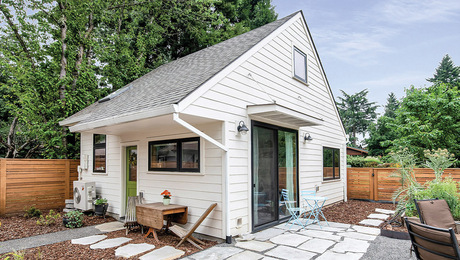Air-Air Heat Pump
I make a guess someone has asked this question, but I couldn’t find any with info that answered my questions.
I built my house a year ago and installed an electric funrace with built in coils for an air conditioner. I was planning to install an air conditioner this spring/summer, but I’ve read and listened to people talk about air-air heat pumps.
I’ve done a little research but i never come up with a satisfactory understanding of the whole deal. I have read Fine Homebuilding’s articles on ground source heat pumps and believe that ‘geothermal’ is over-hyped. Is air-air the similar energy hog?
So our power company says that there is a new product in Canada, maybe USA also, that is much more efficient than previous air-air heat pumps. The research i did concluded that all they did is add an electric element or gas/propane attachement for colder weather! The power company is obviously neutral and only says that the units are more efficient than an electric furnace down to -25*C (-13*F) but won’t give a brand name. The claim is that they provide 3W of heat for every 1W of energy which is similar to the ground source heat pump in my understanding.
For me to get an air conditioner or an air-air heat pump is similar labour of installing the refrigerant lines and electrical lines. The main difference is the unit price which so far i haven’t been able to nail down but have been given some rough figures of a heat pump being $1000 more than an air conditioner.
So my main question is this: If the air-air heat pump is only $1000 more and I can use it to heat down to even -17*C (0*F) for 1/2 the electrical cost (CND$0.07/kWh[USD$0.05/kWh] here in Manitoba), why wouldn’t I do it? It seems there must be something glaringly missing in my line of thought becuase otherwise everyone would be doing it!
Hopefully this post is not too long and someone can help me out with understanding the science and common-sense approach.



















Replies
Most people use electric (resistance) heat because it's simple, cheap to install, easy to install, and reliable. It is, however, just about the most expensive to operate (unless you live where electricity is cheap or other fuels are expensive).
In theory, a heat pump (regardless of "source") is less than half as expensive to operate as resistance (though stilll more expensive than "fuel" in most areas), and this "theory" usually works out pretty well. There is the problem that when the "source" side gets colder than about 0 F the pump (unless really oversized) can't provide enough heat, and when it gets colder still (-15 F or so) the efficiency goes into the toilet or the unit stops working entirely. So supplemental resistance heat is needed in most climates.
I'm a little suspicious of their claim of "new" technology, as the characteristics of the system are determined by physics, and only modest efficiency gains (if any) can be had by "improving" things. I suppose the system today might be 10-20% more efficient than one from 30 years ago, due to minor tweaks, but the technology hasn't really changed.
An air conditioner is a heat pump that is set up to operate in one mode only. Taking heat from a conditioned space (house) and dumping it outdoors.
A "Heat Pump" is the same device, but is set up to operate as an air conditioiner, and can be reversed to move heat from the outdoors to the conditioned space.
Heat pumps are most effecient when the temperature difference between indoor and outdoor are similar. Air to air heat pumps loose effeciency in cold weather, simply because there is not much heat in cold winter air to be pumped indoors. Ground source heat pumps maintain their efficiency year round because the ground is at a similar temperature winter and summer.
Modern heat pumps are more efficient than previous, mainly because of improvements in pump design. This allows them to operate at lower temperatures and still move the heat. Nothing has changed in the principle.
As suplemental heat is requred in winter for most installations in Manitoba, it is less expensive to install a reglar gas fired furnace and an airconditioner, rather than a heat pump. Most people are only concerned with the initial installation, not thinking of the full life time cost of the system.
As you are using electrical resistance for heating, the heat pump will be considerably less expensive to operate.
If you were using a natural gas furnace, the savings of a heat pump would be less.
To decide if a heat pump is worth the extra cost, you need to calculate the energy savings over a heating season. The manufactures will have a chart of the Coefficient of Performace (COP) vs the outside temperature. For each month of the heating season. divide the cost of electricty for heating only by the COP at the average temperature for that month to caclulate how much electricity would be required for the heat pump. Sum up the saving for the year, and then see how many years it will take to pay off the increased cost. You can then decide if the money is best spend on the heat pump, or something else.
Thanks for the excellent comments. I've been busy so didn't get back to thank you. I'm going to see what more i can learn from the local contractors for exact pricing and see if that swings my decision at all.
thanks again.
the; heat pujp experts are at
ecorenovator.com
and they are not afraid of DIY either.